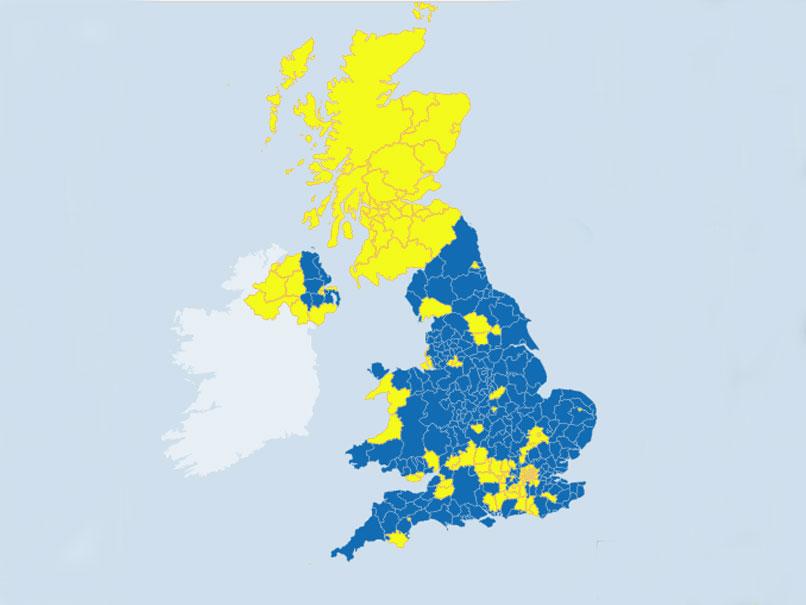Why the North of England will regret voting for Brexit
Don’t mistake Johnson and Gove’s political rhetoric for the idea that they care about the people in Hartlepool, Blackpool and North East Lincolnshire. They came for the EU migrants, and once they are out of the way, they’ll come for working class

Your support helps us to tell the story
From reproductive rights to climate change to Big Tech, The Independent is on the ground when the story is developing. Whether it's investigating the financials of Elon Musk's pro-Trump PAC or producing our latest documentary, 'The A Word', which shines a light on the American women fighting for reproductive rights, we know how important it is to parse out the facts from the messaging.
At such a critical moment in US history, we need reporters on the ground. Your donation allows us to keep sending journalists to speak to both sides of the story.
The Independent is trusted by Americans across the entire political spectrum. And unlike many other quality news outlets, we choose not to lock Americans out of our reporting and analysis with paywalls. We believe quality journalism should be available to everyone, paid for by those who can afford it.
Your support makes all the difference.The EU referendum results map of the UK’s north is a striking sight. Lonely Remain islands float in a sea of Leave counting areas. In the North West, North East and Yorkshire and Humber, 11 out of 125 counting areas voted remain.
Hartlepool and North East Lincolnshire both voted 69.9 per cent to leave, and Blackpool with a count of 67.5 per cent summarised the feeling: the North wants out.
Aside from South Lakeland, the areas voting to stay were clustered in metropolitan university towns and their surrounding areas: Liverpool, Wirral, Sefton; Manchester, Stockport, Trafford; Harrogate, Leeds and York. City hubs had the highest remain votes - Newcastle upon Tyne totalled 50.7 per cent, Liverpool 58.2 per cent, Manchester 60.4 per cent and Leeds 50.3 per cent.
The north is split in two it seems, between the urban centres which have weathered the economic crisis and benefited from migration, and the smaller towns who have suffered unfairly as a result of job losses, stagnating wages and cuts to benefits and public services.
Looking at the most Eurosceptic areas in the North as an example, Hartlepool lost £28.9m by 2015 as a result of public spending cuts; Blackpool has seen £400m worth of cuts since 2011; North East Lincolnshire needs to save a total of £76m by 2017.
In these towns, like my own hometown of Knowsley in the North West, the high streets are dead, the libraries are shut, Sure Start centres don’t exist anymore, NHS waiting times are long, jobs are scarce, wages are low and benefits have been cut. All the while, the cheap migrant labour coming in to fill low-paid precarious positions expanding under the recession becomes far more obvious. These areas aren’t just in crisis; they’re also, unlike their metropolitan neighbours, totally unused to high levels of historical migration and less equipped to culturally absorb recent arrivals.
The people living in these areas decided to “take back control” of their lives, lives which seem to be overtaken by forces outside of their control: the economy, Cameron’s Conservative party and, more questionably, the EU and migrants.
This sentiment was hijacked by the Leave campaign’s Nigel Farage, Neil Hamilton, Boris Johnson, Michael Gove and Iain Duncan Smith. They disingenuously insisted that the EU and migrants had caused the North’s woes. They said nothing of the unregulated markets and austerity that cut their inhabitants wages and benefits.
Despite being pro-free markets and austerity, the EU never forced these ideologies onto us. EU migrants were never to blame for the lack of housing, poor healthcare and education and scarce public services in the UK after Osborne’s budgets. It was the free market, anti-welfare elite who responded to the financial crisis with austerity. Tragically, those are the very people the North just gave a political mandate to.
Now, we’ve signed our own death warrant as another economic recession may be on the cards. In the short term, The Independent’s economics editor Ben Chu has warned that if the pound does not stabilize, “domestic inflation could explode, forcing the Bank of England to raise interest rates and pushing us into a recession, which will cost jobs, reduce incomes and damage millions of Britons' living standards.” Economists at the Organisation for Economic Co-operation have warned that working class Britons face losing roughly one month’s salary of the year by 2020. There is no guarantee that the response won't be more austerity to fix the deficit caused by a second recession.
In the long term, as an ideologically conservative government seeks to negotiate new trade deals with the scorned EU, the rights and wages of those in low paid, un-unionised precarious work - largely the British working class when the EU migrants have been turned away - will be first on the chopping board as the EU legislation that once protected them is swept aside.
This time around, there will be no big society to ease the pain of austerity and low wages as we say goodbye to the £2.5bn from the EU Social Fund that financed charities and community centres, and the £2.9bn funding from the EU Regional Development Fund that has provided resources for organisations helping Britons to find work and start their own businesses.
Don’t mistake Johnson and Gove’s political rhetoric for the idea that they care about the people in Hartlepool, Blackpool and North East Lincolnshire. They came for the EU migrants, and once they are out of the way, they’ll come for working class.
Join our commenting forum
Join thought-provoking conversations, follow other Independent readers and see their replies
Comments